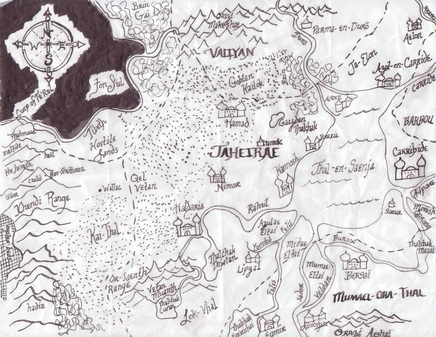Jaheirae: The Exotic Lands

Arnō Urmainen’s Testament:
On the eve of the Great War, I was the athadai of a scanty band of merchants, pickpockets and thieves, young men unfit for military service through deficiencies of birthright or of character, and whores. Among our company were also two cooks, a seamstress and a chronicler whose job it was to see to our patents of travel and our bills of lading. My benefactor, Lorcan Gudal, a baron of Ma-hameth’Kil, had commissioned ten armed guards for our small party as well. Six months of the year we spent traveling abroad, beyond the hostile plains of the Fon S’ul to the exotic lands of the East: Haldaria, Limosfan, Breria and Hannosh. The cities of Arom and Carribide were closed to us in those days because of a plague that had befallen them. At any rate, Carribide is a four day journey by ship, and my meager caravan could seldom afford to venture there plague or no plague. The blockade of Arom, however, was quite a blow, for only there could I find aeshai olives which fetch a pretty purse, particularly in Renatha-Geth. Thus, plague ate up a good share of my profits before they were even made. Many things I saw abroad: cities built without streets where citizens are borne only upon sloops and scows, gondolas and rowboats. Shepherds whose sheep carry pelts so heavy that their back legs must be supported by platforms with wheels in which they roll about through the grazing fields. I have seen goats that crumple at the slightest disturbance and eagles large enough to carry wolves. There are women in Hannosh whose breasts are bandaged and whose clothes are so masculine in appearance that they cannot be singled out from the men. But these tales pale in comparison to the ill omens I witnessed upon the plains of the Fon S’ul in the late summer of an Tir. 385. The wave of this ambush preceded the tide of the Great War, a conflict that would prove the doom of our time. This was how the war began... Read more.
On the eve of the Great War, I was the athadai of a scanty band of merchants, pickpockets and thieves, young men unfit for military service through deficiencies of birthright or of character, and whores. Among our company were also two cooks, a seamstress and a chronicler whose job it was to see to our patents of travel and our bills of lading. My benefactor, Lorcan Gudal, a baron of Ma-hameth’Kil, had commissioned ten armed guards for our small party as well. Six months of the year we spent traveling abroad, beyond the hostile plains of the Fon S’ul to the exotic lands of the East: Haldaria, Limosfan, Breria and Hannosh. The cities of Arom and Carribide were closed to us in those days because of a plague that had befallen them. At any rate, Carribide is a four day journey by ship, and my meager caravan could seldom afford to venture there plague or no plague. The blockade of Arom, however, was quite a blow, for only there could I find aeshai olives which fetch a pretty purse, particularly in Renatha-Geth. Thus, plague ate up a good share of my profits before they were even made. Many things I saw abroad: cities built without streets where citizens are borne only upon sloops and scows, gondolas and rowboats. Shepherds whose sheep carry pelts so heavy that their back legs must be supported by platforms with wheels in which they roll about through the grazing fields. I have seen goats that crumple at the slightest disturbance and eagles large enough to carry wolves. There are women in Hannosh whose breasts are bandaged and whose clothes are so masculine in appearance that they cannot be singled out from the men. But these tales pale in comparison to the ill omens I witnessed upon the plains of the Fon S’ul in the late summer of an Tir. 385. The wave of this ambush preceded the tide of the Great War, a conflict that would prove the doom of our time. This was how the war began... Read more.
